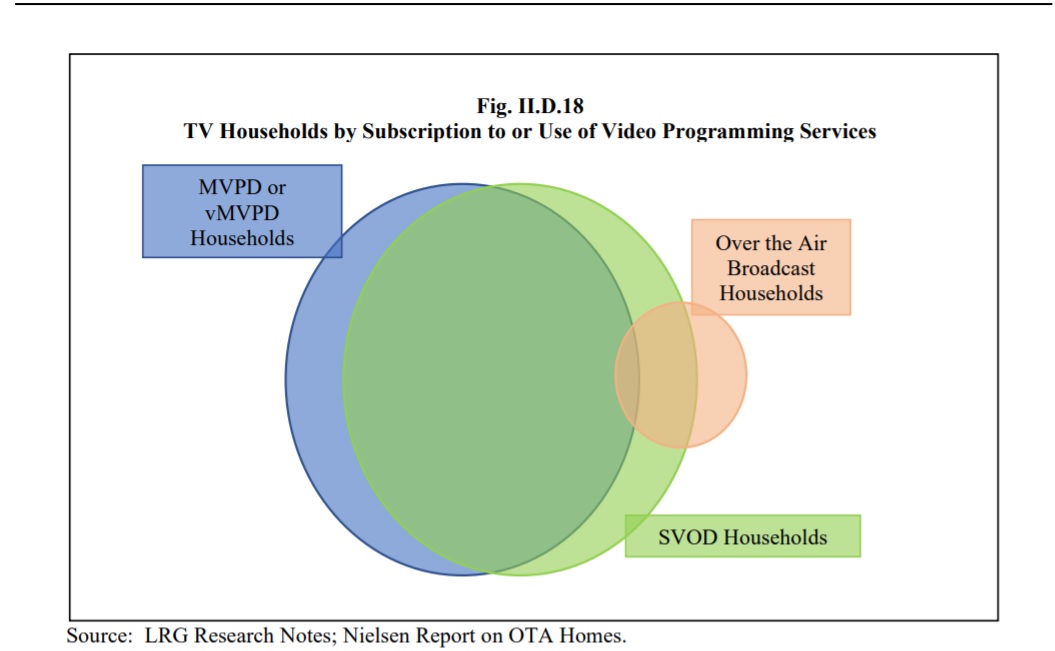FCC Releases Second Marketplace Competition Report
Commissioners' reactions mixed on generally noncontroversial compendium of stats

The smarter way to stay on top of the streaming and OTT industry. Sign up below.
You are now subscribed
Your newsletter sign-up was successful
The FCC has released its second biennial Communications Marketplace Report on competition in the delivery of voice, video, audio and data services (all 250-plus pages of it, plus addendums), including competition from new and emerging services like over-the-top video.
The FCC, per the RAY BAUM's Act that created the report, also assessed whether laws, regulations or practices pose a barrier to competitive entry or expansion of services.
Also Read: Cable Pushes FCC to Recognize Power of OTT
Cable operators, in comments on what should be in the report, said the FCC should start looking at over-the-top video competitors as the 800-pound gorillas they appear to be rather than the plucky upstarts they once were. That view from Washington could change how traditional cable systems and cable broadband providers are allowed to operate, and NCTA-The Internet & Television Association hopes that will be the case.
But rather than drawing conclusions about that competition, the report, as did the previous one, provides instead a data-powered survey of the state of the marketplace, talking about the many online video distributors (OVDs) offerings there are, the rise in original content, and the trend in companies like Disney, NBCU and WarnerMedia launching their own services rather than putting their content on third-party platforms like Netflix--Disney's announcement that it was pulling its Disney and Pixar films from Netflix, for example, or the move from NBCU's The Office from Netflix to Peacock.
The FCC also looked at the relationship between the markets for MVPDs, OVDs, and broadcast TV stations.
One thing the report pointed out was that starting Dec. 20, there would be an apples-to-apples comparison between over-the-top video providers, who generally prominently advertise their full subscription prices in contrast to MVPDs, who typically do not advertise added fees or equipment rental costs. That is because the Television Viewer Protection Act of 2019 requires MVPDs to disclose their total monthly cost to subs before sign-up and clarify any promotional discounts and when they expire.
The smarter way to stay on top of the streaming and OTT industry. Sign up below.
Also Read: FCC Extends MVPD Truth-in-Billing Deadline to December 2020
There was a mix of reactions from the FCC commissioners. Commissioner Brendan Carr approved in part and concurred in part; Commissioner Jessica Rosenworcel concurred and Commissioner Geoffrey Starks approved in part and dissented in part. A concurrence is short of full-throated approval, but counts as a "yes" vote.
Commissioner Carr said he concurred in part because he did not agree with the FCC's approach of looking at the market in sectors rather than recognize the extent of the convergence of competition.
"As I’ve emphasized before, the FCC’s market definitions often look backwards to where the sector has been, rather than where it is going," he said.
Rosenworcel said she concurred because the report fell short by not identifying "the transformational changes that are taking place across these services from both the provider and user perspective. This discussion could also include how these changes may create opportunities for market entry or conversely, further increase barriers to entry.... I think now, during a global pandemic when so much of modern life has migrated online and depends on communications, this kind of analysis would be especially useful. I regret that today’s report does not correct course and offer this analysis."
She also said the report fails to recognize the magnitude of the FCC's work to ensure the safety and reliability of services.
Commissioner Starks said that while much of the report is uncontroversial and its data useful, the decisions it says have contributed to promoting competition and closing the digital divide, like the Republican-backed Lifeline reforms, have done nothing of the sort. He also took issue with the report's lack of a specific discussion of the barriers to broadcast entry for minorities and women.
He agrees with Rosenworcel that the report's agenda for the near term fails to address some needed work on things like promoting affordability in fixed broadband or making sure low income communities share in the broadband bounty. "At the end of this difficult year, we should not need more evidence that internet inequality stands between tens of millions of Americans and equitable access to opportunity. I therefore dissent in part."
Contributing editor John Eggerton has been an editor and/or writer on media regulation, legislation and policy for over four decades, including covering the FCC, FTC, Congress, the major media trade associations, and the federal courts. In addition to Multichannel News and Broadcasting + Cable, his work has appeared in Radio World, TV Technology, TV Fax, This Week in Consumer Electronics, Variety and the Encyclopedia Britannica.

